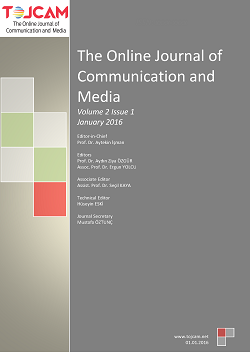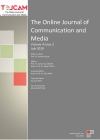TOJCAM - Volume 2 - Issue 1 - January 2016
 A RECEPTION ANALYSIS OF MALE & FEMALE ROLES IN THE ADVERTISEMENTS THAT CARRY DIFFERENT CULTURAL CODES
A RECEPTION ANALYSIS OF MALE & FEMALE ROLES IN THE ADVERTISEMENTS THAT CARRY DIFFERENT CULTURAL CODES Emine û
éƒahin, Meryem Oûé¡uzhan Tuluk
Abstract: This study aims to point out how the individuals from different cultural backgrounds perceive the female & male roles in the Turkish advertisements broadcasted on Turkey and their commenting about these female & male images through their cultural motives. Accordingly, the article tries to answer these following questions: How the audience gets the true messages and connotations that areaimed to be given through the brands/products of company? How the individuals exposed to the advertisements comment on father motherûÂã˜ãÂs roles and female &male roles that take place on the advertisements of a different culture? How their perceptions of these regarding advertisements affect their actual life? Due to the difficulties of a representative sample, the sample group is taken from a small cluster to collect reliable data and in-depth interviews have been conducted with 14 students who are studying in the department of Turkology in their countries and have come to Istanbul University Language Center for summer school. Most of the participants are coming from the countries in the Middle East countries. An audience perception analysis was used in this study while gathering the data about how the participants receive the roles of father/mother represented in the advertisements with the regard of their different cultural perspectives.
 EDUCATION TECHNOLOGY CHANGING FACE OF SCHOOL LIBRARY SCIENCE AND SCHOLARLY COMMUNICATION AREA IN K12
EDUCATION TECHNOLOGY CHANGING FACE OF SCHOOL LIBRARY SCIENCE AND SCHOLARLY COMMUNICATION AREA IN K12 û
éƒebnem Gûô¥rsoy Ulusoy, ûãzge Gûô¥rsoy Atar
Abstract: The theoretical framework is important to understand communication between technology, communication and school library science changing face of Turkey. ûÂã˜éEmpowering Learners: Guidelines for School Library Media Programs (AASL, 2009) charges school librarians ûÂã˜éto play a leading role in weaving such skills throughout the curriculum so that all members of the school community are effective users of ideas and informationûÂã˜ô (Johnston, 2015, 17). Changing first start in human culture, the internet is giving a change for people to communicate the World and other people. Find the information is very easy in 21st century but the important difficulties come to same time. This problem is find the true knowledge problem. ûÂã˜éThe last three decades have been marked by the gradual digitalisation of human culture, knowledge and learning. Evolving digital media and technologies ûÂã˜ã such as computers, the internet and mobile devices ûÂã˜ã have been constantly generating new waves of promises and fads.ûÂã˜ô (Markauskaite, 2010, 79). The face of communication and education change with technology. Digital devices and social media is usefull for peoples communication process. Technological artefacts and computers could be useful for assisting with or doing some traditional cognitive tasks. (Markauskaite, 2010, 92). Traditional communication process start with oral culture. Walter J. Ong said that ûÂã˜éThe Technologizing of the WordûÂã˜ô his book of Orality and Literacy. Firstly oral culture start with the first communication process. People telling and memorize the culturel things. Second of them is literacy when the first letter of semitic alphabet using this literacy culture process is starting. ûÂã˜éWhen this is all said, however, about the Semitic alphabet, it does appear that the Greeks did something of major psychological importance when they developed the first alphabet complete with vowels. (Ong, 2002, 5). This research about the 21st century school library science scholarly communication process changing with technological development and case study for Turkey.
 IMPACT OF EMPLOYEE EMPOWERMENT ON JOB PERFORMANCE IN PUBLIC SECTOR TELECOM ORGANIZATIONS OF PAKISTAN: MEDIATING ROLE OF ORGANIZATIONAL COMMITMENT AND SELF-EFFICACY
IMPACT OF EMPLOYEE EMPOWERMENT ON JOB PERFORMANCE IN PUBLIC SECTOR TELECOM ORGANIZATIONS OF PAKISTAN: MEDIATING ROLE OF ORGANIZATIONAL COMMITMENT AND SELF-EFFICACY Usman Ghani, Muhammad Ilyas, Muhammad Asif Chuadhry, Sumaira Liaqut
Abstract: This research was an attempt to establish and empirically verify the configuration of Employee Empowerment and Job Performance through Organizational Commitment and Self Efficacy in the public sector telecom organizations of Pakistan. It developed a conceptual model that included drivers of Human Resource practices such as Organizational Commitment and Self Efficacy (OC & SE) identified in the literature. It provided a set of measurement scales to operationalize constructs within this model, and to empirically verify their interplay for the execution of successful Job performance considering the role of employee empowerment. It also aimed to fairly understand Human Resource context and to make it more effective with respect to conditions of Organizational Commitment and Self Efficacy in the public sector telecom firms of Pakistan. Instrument was adopted using the base paper and different authors. Data was collected from the Managerial community related to public sector telecom companies within Islamabad, Karachi and Lahore. The conceptual model was developed and tested empirically through a survey of 162 managers representing selected public sector organizations. The research found a Partial mediation effect of Self-Efficacy between Employee Empowerment and Job Performance whereas Organizational Commitment showed no mediation between Employee Empowerment and Job Performance respectively.
 ETHICAL DIMENSIONS OF ADVANCED COMMUNICATION TECHNOLOGIES AND DIGITAL NEW MEDIA
ETHICAL DIMENSIONS OF ADVANCED COMMUNICATION TECHNOLOGIES AND DIGITAL NEW MEDIA S. GûÑzde Dedeoálu
Abstract: Information and communication technologies (ICT) have created fundemental impacts on human life, in every domain of life. Advent of Internet technology is one that brought social change, touching almost every aspect of life which effected the journalism also to a great extent. Digital new media is the novelty which technological revolution brought have provided many opportunities to access the information and to communicate. However, the development is not one-sided, there are also new challenges and threats. This study aims to provide a framework for analysis the ethical issues and establishing an approach to meet ethical challenges in the digital new media.


